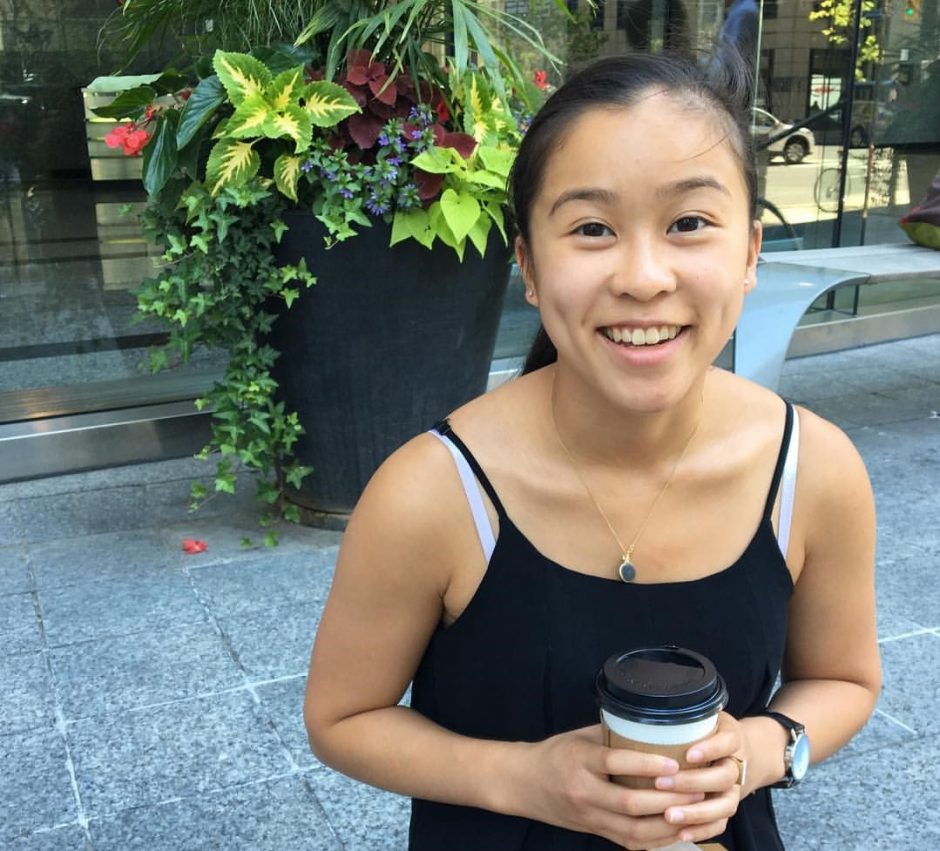
The AMS Impact Grant is “an initiative giving funding to UBC students interested in conducting scholarly research to build knowledge and understanding of post-secondary matters affecting UBC Vancouver’s community” (UBC AMS). UBC’s Psi Chi executives sat down with Psi Chi member Thalia Lang to learn about her experience as an AMS Impact Grant winner.
How did you hear about this grant, and what made you want to apply for it?
The AMS Impact Grant does not merely focus on research and data sets, but the transformation of findings into visible change on-campus.
The grant application popped up on my Facebook News Feed one day, [and] I jumped on the chance to run my first clinical psychological study! I saw this grant as a great opportunity to dive deeper into my research interests.
What research are you doing through this grant?
My study focuses on how first year living conditions relate to the development of suicidal thoughts and attempts (suicide ideation), awareness of mental health resources, and friendship. I’m interested in seeing how on-campus residences and off-campus conditions impacts the mental health of first years transitioning into UBC. Does it really matter where you live first year?
Which faculty member are you doing your research with, and what lab are you in?
I’m working with Dr. Klonsky in the Personality, Emotion, and Behaviour Lab.
What kind of assistance and guidance has Dr. Klonsky provided you with?
Dr. Klonsky has helped me develop my understanding about how to conduct a study. From providing advice about applying to the Behavioural Research Ethics Board to answering my questions about what makes a good research design, he has taught me a lot about how intricate research can be and how the path to publishing a study works.
It’s great to work with a supervisor who recognizes what a novice to research needs to understand [in order] to be successful.
What is your long-term goal, research or otherwise?
I intend to pursue a PhD and become a professor one day. I will focus my future research on anxiety disorders, interpersonal relationships, and developing cognitive-behavioral treatments.
How are your research experiences with this grant contributing to this goal?
This study gives me a sense of what grad school and research really entails. By investigating a research question from start to finish, I get to stumble around applications, work with different survey measures, and gain a better sense of how to become a better researcher. It’s definitely a challenge and a different kind of learning.
What has been the most valuable thing you have learned during your research experiences?
I found it quite hard to transfer what I learned from research methods into practice – to quantify everything, find validated measures for my research question, and communicate exactly what I wanted this study to investigate.
If I wasn’t running this study, I wouldn’t know these were areas I needed to work on to become a better researcher. [These experiences] made me feel challenged, excited, and frustrated – all at once. While I realize there is a lot more I need to learn, [I’ve gained] a sense of direction about how I can become a better researcher.
How has taking these courses such as PSYC 217 or 218 prepared you to conduct real research?
PSYC 217 gave me the methodological background to [determine] how I wanted to conduct my current study. While there are a lot of things I’ve learned through doing this project with Dr. Klonsky and the UBC VP Student Research Office, PSYC 217 provided immense insight about how to evolve an idea into an actual study. I have yet to complete data collection, but I’m confident what I learned about SPSS in PSYC 218 will help plenty in analyzing my data.
What do you intend on doing with your findings?
I will organize an event to increase awareness of mental health resources on-campus in first year students. The details will be dependent on my findings and which first year students (commuters or those living on residence) are most important to address.
I intend to present my findings at conferences and to publish my study with Dr. Klonsky. Additionally, I plan to reach out to on-campus mental health organizations and share my findings to provide insight about which groups may be more at risk for mental health problems.
This year, UBC’s Psi Chi chapter wants to help connect students with possible mentorship opportunities. If you’re a student and you have questions about Thalia’s experiences with the AMS Impact Grant, please email us at psichi@psych.ubc.ca. We can put you in contact with Thalia.
– Brandon M. Woo and Natalie Wong
28 July 2016